After nearly thirty years of operation in Hong Kong, Radio Free Asia (RFA), a sister outlet to VOA (Voice of America), has shuttered its bureau in the city and withdrawn its full-time staff, citing concerns over dwindling press freedom, the outlet announced in a statement released on Friday.
“RFA’s decision to restructure its operations in Hong Kong stems from mounting apprehensions regarding the safety of our staff and reporters in the city. Although RFA will maintain its official media registration, we no longer maintain a permanent presence in Hong Kong, and our physical bureau has been closed,” stated RFA President Bay Fang, VOA reported.
The move comes shortly after the enactment of Article 23 by the Hong Kong authorities, a national security law that watchdogs warn will further erode press freedom within the city.
The new legislation represents a domestic expansion of the contentious national security law imposed by Beijing in 2020, which criminalised acts such as secession, subversion, terrorism, and collusion with foreign forces. Article 23 broadens these provisions to include offences like espionage, external interference, and the theft of state secrets.
Press freedom advocates, including Reporters Without Borders (RSF), expressed grave concerns about the implications of the new law.
“By incorporating Beijing’s national security measures into Hong Kong’s domestic legislation, the government aims to maintain the facade of a jurisdiction governed by the rule of law while continuing its crackdown on independent voices,” remarked Cedric Alviani, RSF’s Asia-Pacific bureau director, in a statement issued prior to the law’s enactment, as reported by Voice of America.
“We urge democratic nations to exert pressure on Chinese authorities to restore full press freedom in the region,” Alviani urged.
RFA, which established its Hong Kong bureau in 1996, specifically cited Article 23 as a driving factor behind its decision to withdraw from the city.
“The actions taken by Hong Kong authorities, including labeling RFA as a ‘foreign force,’ cast serious doubts on our ability to operate safely following the implementation of Article 23,” Fang asserted.
VOA has reached out to the Hong Kong Security Bureau for comment.
For years, Hong Kong enjoyed praise for its vibrant and unrestricted media landscape. However, following the introduction of the national security law in 2020, the city’s press freedom, along with other civil liberties, witnessed a rapid decline.
Hong Kong and Chinese officials have refuted claims that the law is detrimental to the city’s media environment, asserting instead that it has contributed to stabilising the region.
The plight of independent media in Hong Kong is underscored by the ongoing national security trial of pro-democracy publisher Jimmy Lai.
The 76-year-old British national faces charges of “collusion with foreign forces” under the national security law, as well as sedition, charges he vehemently denies. If convicted, Lai could face life imprisonment.
Despite assertions from Hong Kong officials that Lai’s trial is fair, press freedom groups and Western governments have decried the charges as politically motivated and unfounded.
Although RFA is physically departing from Hong Kong, the outlet affirmed its commitment to continue covering developments in the city.
“This restructuring signifies RFA’s transition to employing a different journalistic model tailored for restrictive media environments,” Fang remarked in the statement.
“For our audiences in Hong Kong and mainland China, who rely on RFA for timely and uncensored journalism, we assure you that our programming and content will continue without interruption,” she affirmed, Voice of America reported.


